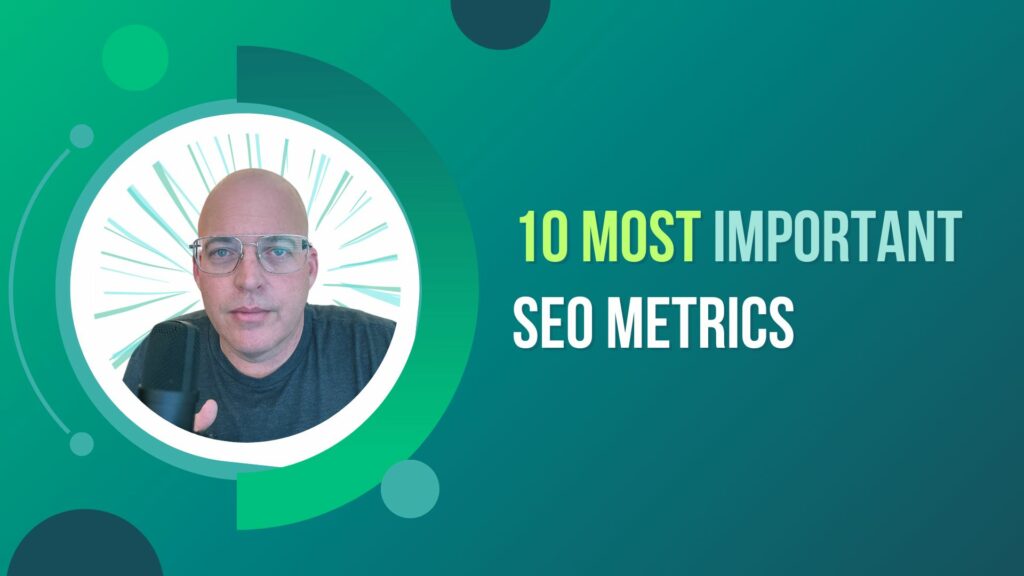Monitoring SEO metrics is a core component of any effective digital marketing plan. In an increasingly competitive online environment, companies and website operators depend on search engines for increasing visibility, attracting traffic, and boosting conversions. Moreover, the value of monitoring SEO metrics is that it offers a way to assess the effectiveness of your online strategy.
In the realm of digital marketing, grasping SEO metrics is important. Consumers turn to search engines for information in this age of widespread internet connectivity. Optimizing your online footprint goes beyond just enhancing search engine placement. Furthermore, it’s about formulating a digital approach that aligns with your target audience, addresses their requirements, and establishes credibility.
Understanding SEO Metrics
SEO metrics serve as measurable indicators that shed light on the success of a website’s search engine optimization initiatives. These metrics cover many elements, such as keyword placement, organic search traffic, user interaction, and conversion percentages. In digital marketing, SEO metrics are navigational tools that steer companies through their online endeavors. Moreover, they thoroughly analyze a website’s standing in search engine results pages (SERPs), reflecting its general online prominence.
The significance of SEO metrics in digital marketing is immense, as they offer essential data for decision-making. By consistently monitoring and evaluating these metrics, companies can refine their SEO tactics to align more closely with their objectives. For example, if a company observes that particular keywords frequently secure top rankings, it can focus more resources on optimizing them to heighten the likelihood of drawing in organic visitors. Moreover, elevated bounce rates on certain web pages indicate a necessity to elevate the quality of the content or the user interface.

Keyword Performance Metrics
Cracking the Keyword Code: Significance of Ranking
Keyword ranking serves as the pulse of SEO, defining your website’s position in the competitive online environment. Securing a top spot in search results goes beyond merely appearing on the first page; it involves claiming a coveted position that signifies your website’s visibility, reliability, and relevance to search engines and users. Sites that rank high are more apt to attract organic visitors, establishing keyword ranking as a critical measure in the SEO framework. Gaining insight into the performance of your keywords and fine-tuning them can revolutionize your pursuit of digital prominence.
Unveiling the Invisible: The Concept of Keyword Visibility
Keyword visibility extends past simple rankings to offer a complete perspective of how your website fares across search engine results pages (SERPs). This metric evaluates your main and long-tail keywords that bring in focused traffic. Think of keyword visibility as a beacon in the digital world, highlighting how users can locate your content. This aspect incorporates the complexities of search algorithms, local SEO factors, and the competitive scene, providing a nuanced understanding of your online footprint. In essence, keyword visibility ensures your website stands out prominently, rather than getting lost, when users search for terms pertinent to your content.
Clicking to Success: CTR’s Dance with Keywords
Click-through rate (CTR) is the interplay between your keywords and your target audience and is a significant metric in SEO. Simply showing up in search results isn’t sufficient; your website must also draw users in to click and browse your content. CTR demonstrates the efficacy of your titles and meta descriptions in grabbing user interest and motivating them to engage. It acts as the connector between what users search for and how they interact with your website. Grasping the relationship between CTR and keywords enables you to create captivating titles and descriptions that connect with your audience, thereby increasing organic traffic and refining your SEO approach.
On-Page SEO Metrics
The Foundation of Success: Importance of On-Page SEO
On-page SEO is the fundamental framework that shapes your website’s online presence. Much like the architectural plans for a sturdy building, it establishes the base for your website’s performance in search engine results. This foundational layer of SEO involves fine-tuning individual web pages to improve visibility in the eyes of search engines. But on-page SEO is not just about keywords; it also includes the quality of the content, the user experience, and various technical factors. The goal is to make your web pages discoverable by search engines and valuable and engaging for your audience.
Crafting the Digital Welcome Mat: Significance of Meta Tags and Descriptions
Meta tags and descriptions are the virtual welcome mat to your website. Think of them as the intriguing signs and enticing descriptions that draw visitors into a store. These on-page elements are pivotal in attracting organic traffic and encouraging clicks from search engine results pages. Meta tags provide concise information about a page’s content, while meta descriptions offer a sneak peek into what users can expect. Their importance comes from their capacity to sway how users act, making them key instruments for increasing click-through rates and enhancing your website’s SEO results.
Heading for SEO Success: The Impact of Header Tags
Header tags are the signposts that guide search engines and users through the content on your web pages. Think of them as the chapter titles in a book; they break down your content into easily digestible sections. Header tags enhance the readability and structure of your content and carry substantial SEO weight. They help search engines understand different sections, which can influence how your content ranks.

Off-Page SEO Metrics
Linking the Dots: The Symphony of Backlinks in SEO
Backlinks act as individual notes in the SEO symphony, collectively contributing to a website’s online standing. Every backlink is like an endorsement from another website, indicating to search engines that your content has authority and is worth visiting. These digital links function as conduits, directing users from disparate parts of the internet to their online space. In SEO, backlinks are comparable to the role of instruments in an orchestra; they amplify the total output, allowing your website’s presence to echo more strongly across the expansive digital arena.
The SEO Powerhouse: Unveiling the Secrets of Domain Authority (DA)
Domain Authority (DA) is a powerful tool in the SEO toolkit, slicing through the online clutter to highlight a website’s robustness and trustworthiness. This valuable metric quantifies a website’s overall clout by evaluating the quality and number of its backlinks. Consider DA a special lever that can either boost or impede your website’s journey toward online prominence. Grasping the notion of DA is like finding a concealed guide; it offers the means to unveil the mysteries of your website’s authority and position in the expansive online environment.
Social Alchemy: The Importance of Social Signals in SEO
Social signals serve as subtle endorsements in the busy online sphere, indicating to search engines that your content is engaging and worthy of sharing. These signals include likes, shares, comments, and mentions across various social media outlets, offering a comprehensive view of how your content resonates beyond your website. Think of social signals as the force that elevates your digital presence, lifting your content to improved positions in search rankings.
Technical SEO Metrics
Race Against the Clock: The Significance of Page Load Speed
Page load speed is the speedster in the SEO race, dictating whether your website clinches victory or trails its rivals. This digital timer quantifies the swiftness of your web page’s load for users. The importance of page load speed can be seen in its immediate effect on user experience and how search engines place your site on SERPs. Much like a tardy runner risks falling behind in a competition, a website with slow load times risks losing visitors and sinking in search rankings.
Responsive Charm: Exploring the Concept of Mobile-Friendliness
Mobile-friendliness serves as the adaptable character in the digital environment, effortlessly conforming to diverse screen dimensions and gadgets. This attribute guarantees that your website appears and operates impeccably on mobile devices, just as on traditional computers. In a time when mobile devices often serve as the main access point to the online world, mobile-friendliness is like setting up a flexible and appealing platform welcoming all types of digital visitors. The focus isn’t just on visual appeal; it’s about making your content easily accessible and engaging for mobile users, affecting their satisfaction levels and your site’s standing in search engine rankings.
Mapping the Digital Landscape: The Importance of XML Sitemaps
XML sitemaps are navigational guides that steer search engines through the intricate maze of your website’s content. These sitemaps act as an architectural plan detailing the arrangement and hierarchy of your web pages to facilitate efficient indexing by search engines. The value of XML sitemaps can be likened to carving out a discernible trail through a thick woodland; they help search engine bots traverse your website easily, ultimately enhancing your site’s visibility and position in search rankings.

User Engagement Metrics
The Bounce Rate Enigma: Unraveling Relevance in User Engagement
Bounce rate is the mysterious element in the user engagement equation, reflecting how your website’s content can engage and retain visitor interest. Think of it as the swinging door at a busy retail outlet; if people enter and quickly leave without further exploration, it hints at an engagement problem. Grasping the implications of bounce rate is like untangling the complex patterns of human behavior online. A high bounce rate may suggest that your content isn’t connecting with your audience, signaling the need for improvements in content quality or user experience to keep visitors interested and exploring your online space.
Time Well Spent: The Importance of User Session Duration
User session duration is the clock that measures the time visitors spend within the walls of your digital domain. It reflects the depth of engagement and interest your content generates. Think of it as the attention span of a captivating storyteller; the longer the story holds the listener’s interest, the more engaging it is. The importance of user session duration lies in indicating whether your website succeeds in captivating and satisfying your audience’s curiosity. Longer sessions often lead to higher user satisfaction and improved search engine rankings.
Journey Through Pages: How Pages per Session Metric Indicates User Engagement
Pages per session metric is the trail of breadcrumbs that users follow as they explore your digital landscape. It reveals the extent to which visitors delve into your content, akin to turning the pages of an engaging book. This metric’s significance lies in its capacity to gauge the depth of user engagement. A higher page per session metric suggests that visitors find your content intriguing and valuable, encouraging them to explore multiple pages.
Conversion Metrics
Crucial Crossroads: The Significance of Conversion Rate
Conversion rate is the guiding instrument for your online ventures, showing how your website converts visitors into meaningful actions such as purchases, form completions, or newsletter sign-ups. Consider it the link between website visits and impactful engagements. The conversion rate’s worth resides in its ability to gauge how well your website accomplishes its set goals. A robust conversion rate resembles a frequently used route that efficiently guides users to their intended endpoint, whereas a low conversion rate implies the presence of hindrances and diversions.
Navigating Success: How Goal Completions Relate to SEO Efforts
Goal completions are the milestones along the SEO journey, indicating whether you’re on the right track. These goals can range from filling out a contact form to downloading an eBook, and they’re intimately tied to the specific objectives of your website. Think of them as the checkpoints on a map, helping you track progress toward your destination. The relationship between goal completions and SEO efforts is like the alignment of stars in navigation; when they coincide, you’re on course. By monitoring and optimizing for these goals, you ensure that your SEO strategy is not just about traffic but also about achieving tangible results that align with your business objectives.
E-Commerce Alchemy: The Role of E-Commerce Metrics in SEO
E-commerce metrics are the transformative formulas that convert casual online browsers into dedicated customers. These metrics include conversion rate, average order value, and revenue per visitor, and they hold special importance for online businesses. Imagine them as the recipe that transmutes idle browsers into revenue-generating customers. The function of e-commerce metrics in SEO can be likened to the perfect blend of science and alchemy; when executed correctly, they have the power to convert digital engagements into actual earnings. By concentrating on these metrics, you accomplish more than just evaluating the effectiveness of your SEO activities; you also refine your approach to optimize revenue creation.

Content Performance Metrics
Crafting Excellence: The Importance of Content Quality
Content quality is the cornerstone upon which your digital empire is built, and it’s the difference between merely existing online and thriving. Think of it as the artisan’s touch in a masterpiece; it captures the attention, engages the audience, and leaves a lasting impression. The importance of content quality lies in its power to attract and retain visitors, establish authority, and encourage them to take desired actions. Just as a captivating story keeps readers turning the pages, high-quality content keeps users scrolling, reading, and interacting.
Time Well Spent: How Dwell Time Reflects Content Performance
Dwell time is the silent applause in the theater of online content, measuring how long visitors linger on your pages. It’s akin to the engaged audience that stays seated even after the final act, wanting more. Dwell time reflects content performance by indicating whether your content meets user expectations, fulfills their needs, and encourages them to explore further. The longer visitors dwell on your content, the higher the chances of improved search engine rankings.
Local SEO Metrics
Navigating the Neighborhood: The Relevance of Local Search Ranking
Local search ranking is the compass for businesses looking to thrive in their immediate neighborhood. Think of it as the treasure map that guides local customers to your doorstep. The relevance of local search ranking lies in its ability to connect your business with nearby consumers. Local search ranking ensures your business is prominently featured when potential customers search for local solutions.
Mastering the Local Stage: The Importance of Google My Business (GMB) Metrics
Google My Business (GMB) metrics are the stage lights that illuminate your business’s presence on the local search stage. They encompass insights like views, clicks, and customer actions on your GMB profile. GMB metrics are the backstage pass to understanding how users interact with your business listing on Google. Their importance lies in their ability to influence your local search ranking and online visibility. Optimizing your GMB metrics can improve your business’s reputation in the eyes of both customers and search engines.
The Review Revolution: How Online Reviews Impact Local SEO
Online reviews are the currency of trust in the local business world and profoundly impact your local SEO efforts. Think of them as the voices of satisfied (or dissatisfied) customers echoing through the digital marketplace. Online reviews influence local SEO by shaping your business’s reputation and credibility, impacting search engine rankings and consumer trust. Positive reviews act as endorsements, while negative ones can deter potential customers. Understanding the significance of online reviews is akin to recognizing that in the age of online shopping and local searches, your business’s reputation is a precious asset that can make or break your local SEO success. Managing and encouraging reviews can steer your business toward a positive online presence and higher local search visibility.

Analyzing and Interpreting SEO Metrics
Unveiling SEO’s Hidden Treasures: Tips for Effective Data Analysis
Effective data analysis in SEO metrics is akin to a treasure hunt. It’s comparable to solving a complex puzzle, bringing the hidden elements of your digital success to light. To excel in this area, you might employ strategies such as segmentation to focus on particular data points. Examine your data rigorously, and use visualization tools to convert raw figures into insights you can act on.
Riding the Waves of SEO: How to Identify Trends and Make Data-Driven Decisions
You need to be adept at reading the patterns in your metrics. To do this well, set up a consistent schedule for reporting and examine data to spot trends. Statistical analysis can help you determine the validity and implications of these trends. With these insights, you can fine-tune your SEO strategy to better align with emerging patterns.
Common Pitfalls in SEO Metrics Analysis
Navigating the SEO Minefield: Mistakes to Avoid When Interpreting Metrics
Navigating the complexities of SEO metrics can be akin to a negotiating maze, where one wrong turn can lead to setbacks. Furthermore, you can better interpret your SEO data by knowing these common pitfalls.
Charting the Course: Guidance on Overcoming Challenges in SEO Analysis
Mastering the complexities of SEO analysis is like being an expert sailor navigating through choppy waters. This section serves as a guide for tackling the intricate aspects of understanding SEO metrics. Moreover, topics covered include methods for coping with unpredictable data and employing A/B testing.
SEO Metrics: The Digital Compass for Success
Navigating the complex digital marketing maze requires a precise set of tools. These metrics act as guiding lights, helping us understand where we are and need to be. They expose strengths to capitalize on and weaknesses to address, effectively becoming the storytellers of your online narrative. Furthermore, treat these metrics as your loyal allies, helping you refine your strategy, and achieve your online objectives. Moreover, let these metrics be your guiding star, leading you toward digital triumph in an ever-evolving online environment.

Frequently Asked Questions
How Often Should I Monitor SEO Metrics?
The frequency of monitoring depends on your goals and the specific metrics. Generally, monitoring key metrics regularly and conducting more in-depth analyses to identify trends and patterns is a good practice.
What is the Most Important SEO Metric?
There isn’t a single “most important” metric, as it varies depending on your goals. However, metrics like organic search traffic, conversion rate, and keyword rankings are often considered highly significant for many businesses.
Are Local SEO Metrics Essential for My Business?
Local SEO metrics are crucial if your business serves a local or regional audience. Furthermore, they help you improve your online visibility within your geographic area and compete effectively with other local businesses.
How Long Does it Take to See Improvements in SEO Metrics?
The time it takes to see improvements can vary widely depending on factors, SEO efforts, and your website’s history. Generally, it can take several weeks to months before significant changes become noticeable.
Can I Rely Solely on SEO Metrics for my Digital Marketing Strategy?
While SEO metrics are crucial, they should be part of a broader digital marketing strategy. Combining SEO metrics with other data sources can provide a more comprehensive understanding of your online performance and help you make well-informed decisions.








